If you’re a food lover, you’re probably familiar with David Chang. As one of the most visible celebrity chefs of our time, Chang is perhaps best known for founding the Momofuku restaurant group in 2004, which sparked nearly two decades of TV shows (like Netflix’s Ugly Delicious), media appearances, and books.
In 2018, he launched the brand’s consumer packaged goods line, Momofuku Goods, which sells Asian-inspired groceries like “restaurant-grade” soy sauce and air-dried instant noodles. Shortly after launching, the brand added “chili crunch” to its roster to capitalize on Americans’ rapidly growing appetite for chili crisp, a sweet and spicy, umami-packed chili oil condiment that’s been a household staple in China (and many other Asian countries) for centuries.
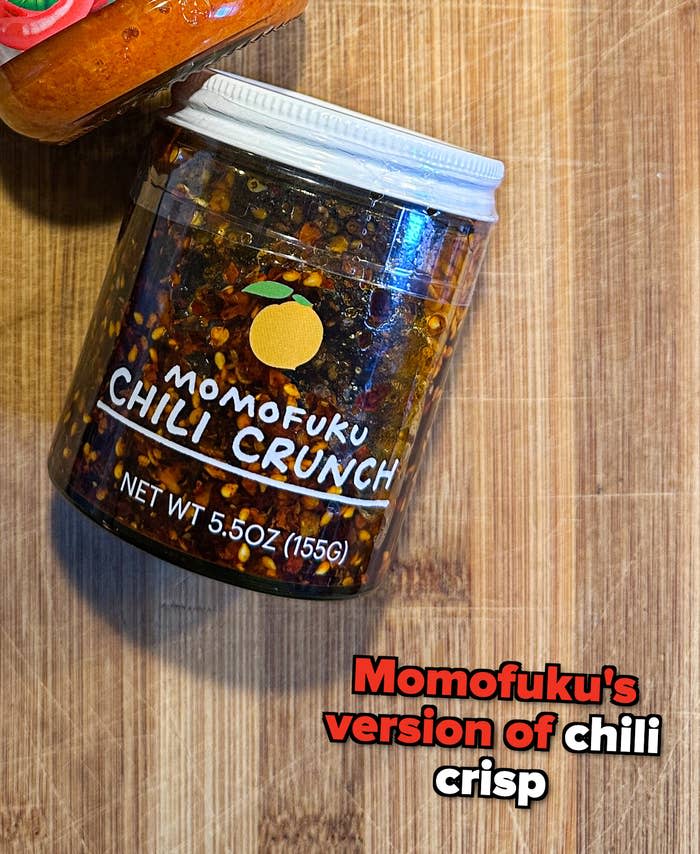
Late last week, David Chang, Momofuku, and their chili crunch offering became the main characters in a heated PR crisis. On Thursday, the Guardian reported that Momofuku sent cease-and-desist letters to at least seven companies that branded their condiments as “chili crunch” or “chile crunch” as they attempt to trademark the former with the US Patent and Trademark Office.
It’s worth noting that Momofuku has owned the trademark rights to “chile crunch” since last year as part of a legal settlement with Chile Colonial, a Denver-based company that produces a Mexican version of chili crisp (similar to salsa macha) — to which Momofuku now licenses the “chile crunch” trademark.
Homiah, a brand that sells a Malaysian sambal chili crunch product, was seemingly one of the first companies to make news of the cease-and-desist public. Founder Michelle Tew told the Guardian that the letter claimed Homiah’s product to be a “trademark infringement” and that the company had 90 days to cease using the “chili crunch” trademark.
In the caption to an Instagram post, Tew expressed how “shocked and disappointed” she was to be legally threatened by “a well-known and respected player in the Asian food industry” — all for “selling a product that is part of [her] family’s history and culture.”
MìLà, a company specializing in frozen soup dumplings and founded by husband-and-wife team Caleb Wang and Jen Liao, posted a similar statement on Instagram after receiving their own cease-and-desist from Momofuku, stating that there’s “plenty of room for others to share their authentic flavors and cultural experiences.”
Jing Gao, founder of Fly By Jing (and frequently cited as one of the most central figures in popularizing chili crisps in the States), has also publicly spoken out against Momofuku in recent days through Instagram and her Substack newsletter — though, according to the LA Times, Fly By Jing recently applied to trademark “Sichuan chili crisp” and “Chengdu crunch” before withdrawing the applications shortly after.
In the hundreds of comments across all three posts, the public’s inherent frustration with Momofuku is palpable. Many commenters (including the beloved online community Subtle Asian Baking) call for Chang to apologize to the AAPI community for “bullying” smaller Asian-owned businesses.
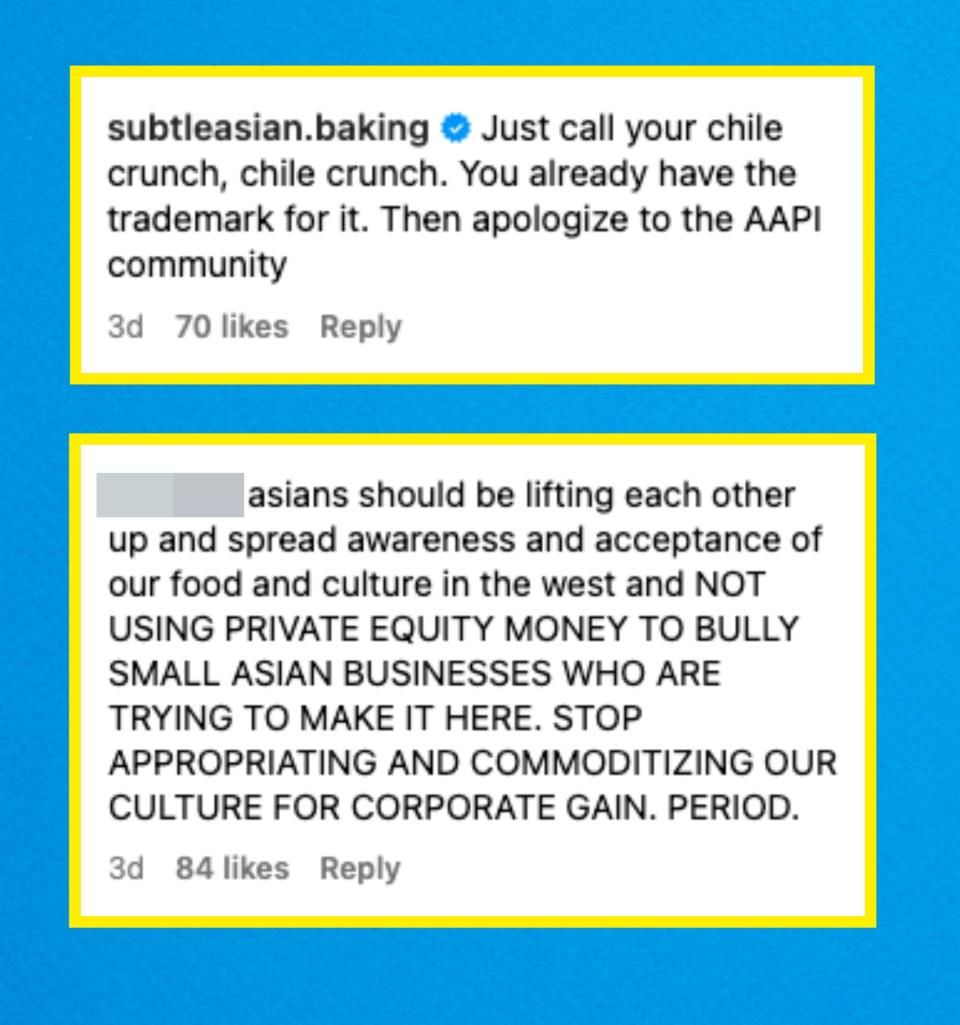
Others focused on the hypocrisy of Chang, a Korean American chef, seeking to trademark the name of a condiment with Chinese roots, insinuating that Chang “got famous” off of non-Korean foods and is now trying to “monopolize the market.” (In case you didn’t realize: The entire Momofuku empire is a nod to Momofuku Ando, the Taiwanese Japanese inventor who created instant noodles and founded Nissin Foods.)
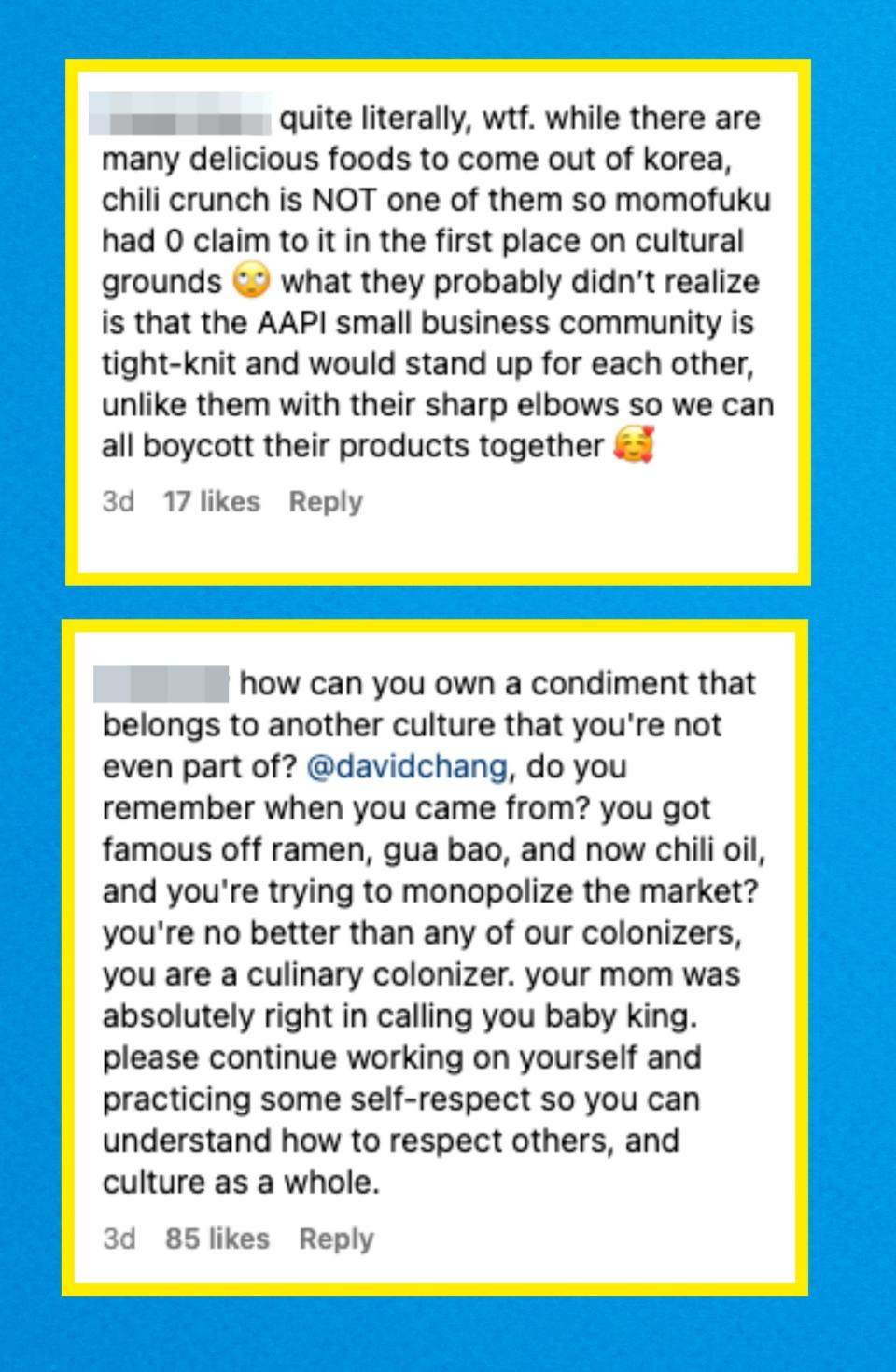
Several small Asian markets and grocers (like Rice Market in Washington, DC) also pledged their commitment to no longer sell Momofuku Goods products in their stores as a result of the company’s decision.
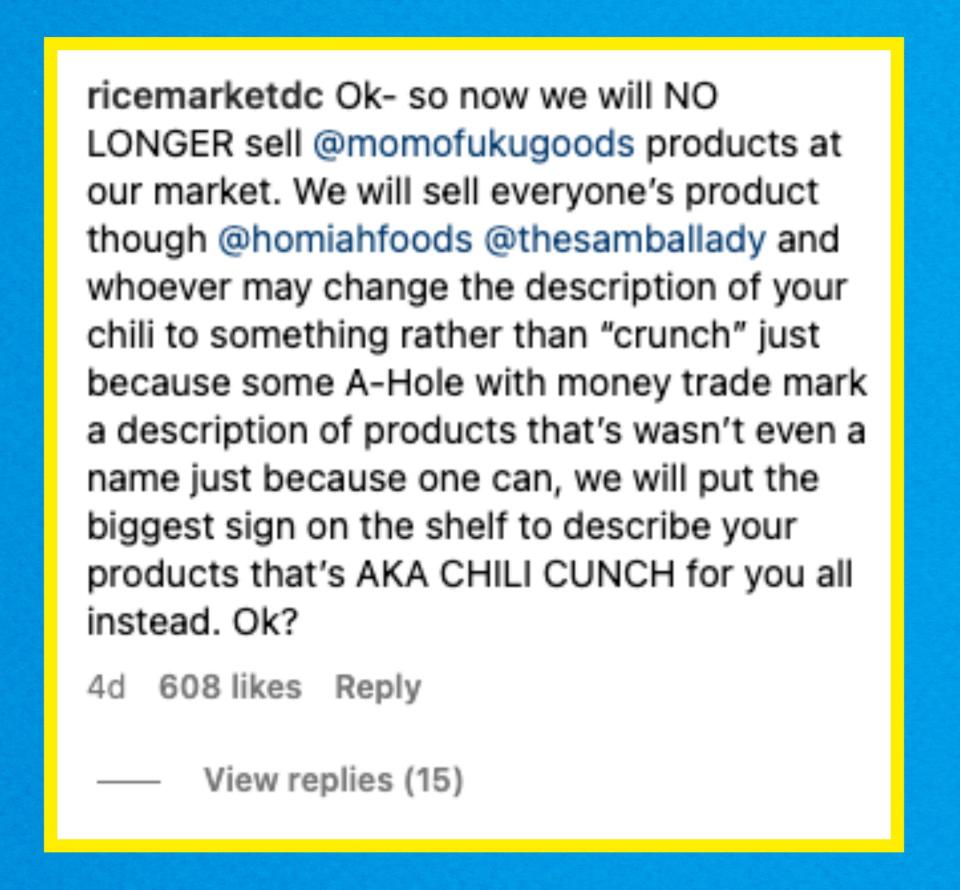
As the drama made its way to X (aka Twitter) and TikTok over the weekend, even more discourse ensued — particularly among AAPI creators and public figures. In a tweet seen by nearly 150,000 X users, Chef Jon Kung said that community approval doesn’t matter “if all you want to do is win,” nodding to Chang’s money-amassing Momofuku empire; last year, Momofuku Goods alone brought in $50 million.
Momofuku trademarking chili crunch shows that having the approval of your community doesn’t matter if all you want to do is win. He didn’t want to be the best. He doesn’t want to be respected by AAPI. He wants to be the who white suburbanites reach for when they’re at Erewhon.
— Jon Kung (@ChefJonKung) April 5, 2024
“He doesn’t want to be respected by AAPI,” they wrote. “He wants to be the [one] who white suburbanites reach for when they’re at Erewhon.”
Additionally, nearly half a million X users saw Simu Liu’s viral tweet challenging Momofuku to a “blind taste test of both [their] ‘chili crunch’ sauces.” (Simu Liu is, as of last year, the previously-mentioned MìLà’s Chief Content Officer.)
Hey @momofuku, I hear you’re bullying businesses over use of the term ‘chili crunch’. As Chief Content Officer of MiLa, I propose a blind taste test of both our ‘chili crunch’ sauces. Winner keeps the name, loser (it’ll be you) backs off.Game on? 😉https://t.co/jidHIBQzf3
— Simu Liu (@SimuLiu) April 5, 2024
In a reply to another X user, he reiterated that there’s “room for all in the marketplace,” and that Momofuku’s attempt to trademark chili crunch “is like trying to claim ‘ketchup’ or ‘mayo.'”
Appreciate it 🙂 Asian chili crunches actually predate all of our businesses and will endure long after. Trying to claim ownership of it is like trying to claim ‘ketchup’ or ‘mayo’. There’s room for all in the marketplace, from the mom and pops to the MiLas and Momos!
— Simu Liu (@SimuLiu) April 5, 2024
His point is one that’s very much worth considering. Sure, chili crisps or crunches (or whatever other descriptor you could toss in) may not carry the same weight as ketchup or mayonnaise here in the States. But judging by the condiment’s burst in popularity over the past few years, it might not be far off from reaching the status of another well-known Asian condiment that once took the United States by storm: sriracha.
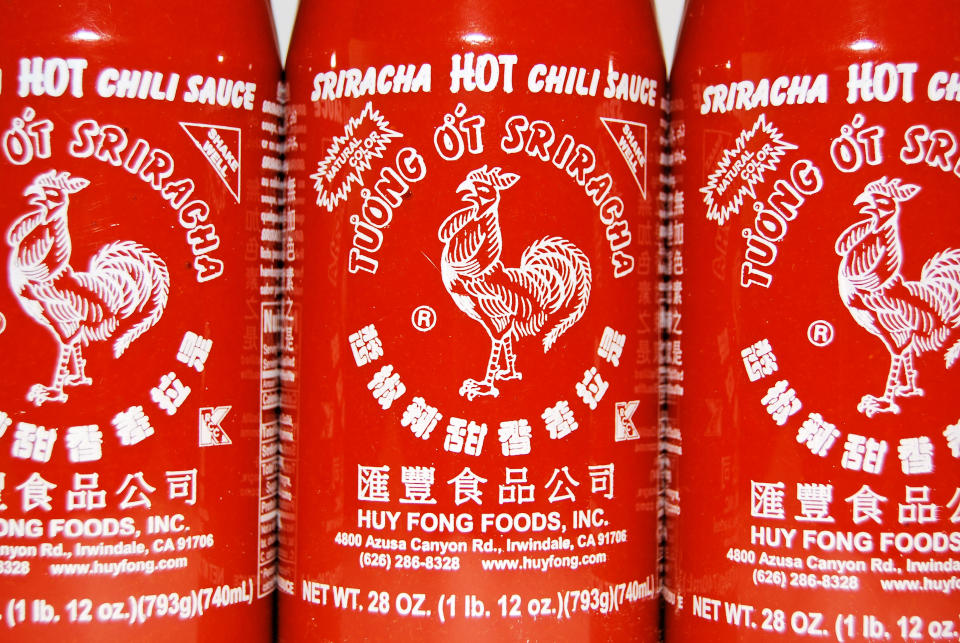
David Tran, the Vietnam-born founder of Huy Fong Foods (the first company to popularize the Thai-inspired sriracha hot sauce condiment in the US), never attempted to trademark “sriracha.” Instead, he trademarked the logo, including the iconic rooster and green cap. He even claimed that his brand had received “free advertising” over the years thanks to unrestricted use of the word sriracha. Throughout the recent Huy Fong sriracha shortage — a dark time in my household! — we saw that free advertising played out in real time. With minimal quantities of Huy Fong sriracha sauces available globally, people still craved the “original” despite having access to some uber-delicious, newer contenders in the sriracha market.
Amidst growing calls for the boycott of Momofuku products and businesses, as illustrated by the slew of negative comments on recent or pinned posts from the brand, it’s impossible to know if all the brands who received cease-and-desists will comply or choose to enter costly legal battles instead. According to the Guardian, several smaller businesses they spoke with have already given in to Momofuku’s demands and refused to go on the record with the publication about their experience for fear of retaliation.
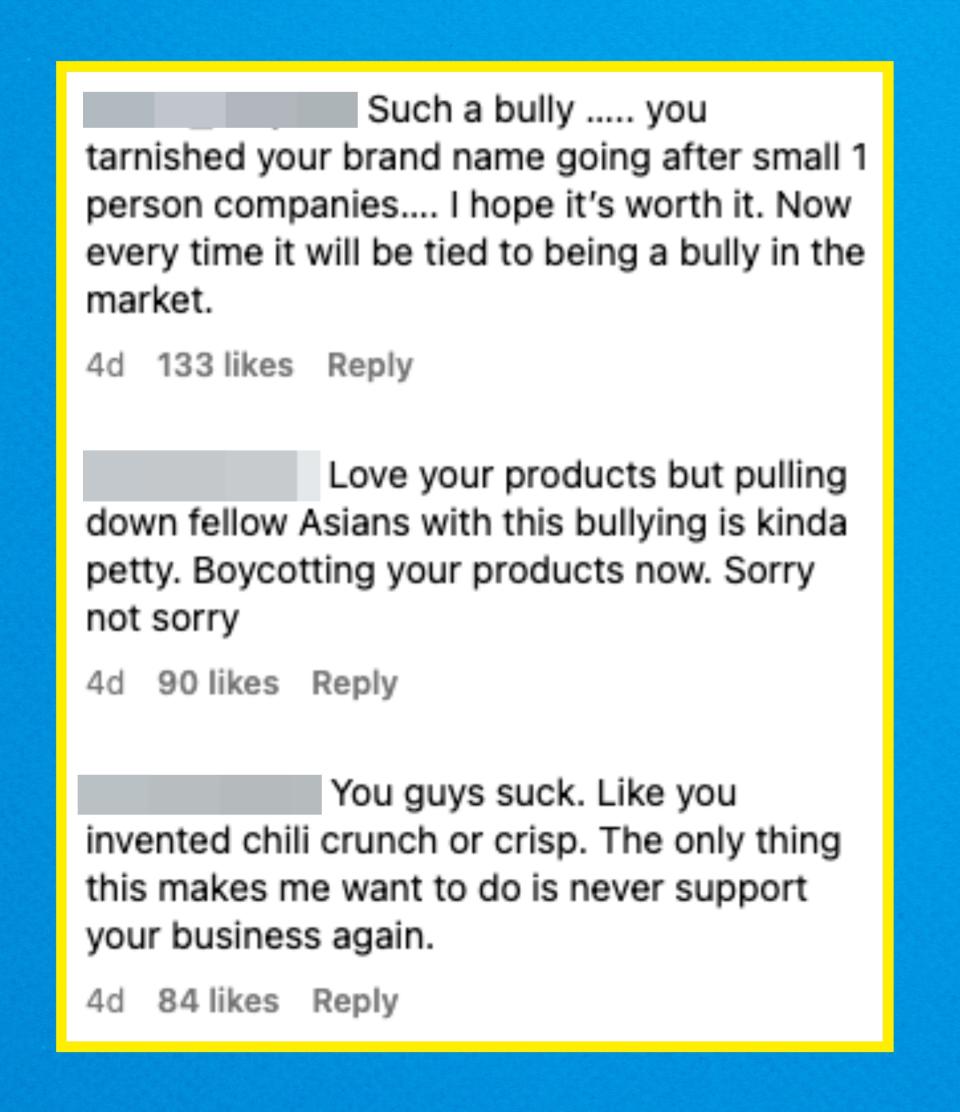
According to Stephen Coates, the lawyer representing Homiah, Momofuku’s decision to target smaller businesses with limited cash lying around to fund a lawsuit is by design. “This is a clear case of them picking on small businesses with a letter campaign, hoping they’ll cave because of the financial pressure,” he told the Guardian. “The phrase that I would use to refer to Momofuku, in this case, is a trademark bully.”
If there’s one sneaky silver lining of this dispute for everyone who’s not Momofuku, it’s the enhanced visibility and reach that comes with such a public battle. As consumer branding and marketing expert @shwinnabego says in a viral TikTok, social media users (and chili crisp fans) everywhere are now making a concerted effort to support the brands affected. “David Chang’s bullying of these other chili crunch brands is possibly one of the better things that could happen to them,” he says.
@shwinnabego / Via tiktok.com
Case in point: People are using their platforms to boost AAPI-run chili crisp businesses, and as a result, some are noticing increased visibility and brand awareness.
A spokesperson for Momofuku responded to the PR crisis in a statement to the LA Times, saying that the trademark was never intended to “stifle innovation in a category that we care deeply about.” They added: “When we created our product, we wanted a name we could own and intentionally picked ‘chili crunch’ to further differentiate it from the broader chili crisp category.”
BuzzFeed has also reached out to Momofuku for comment, and we’ll let you know if we hear back.
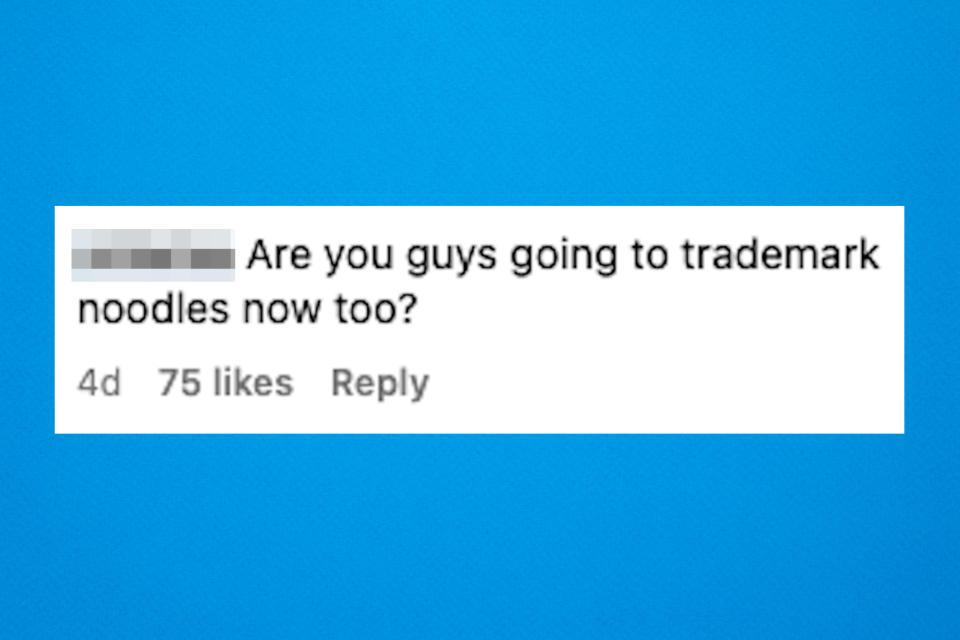
Signup bonus from




